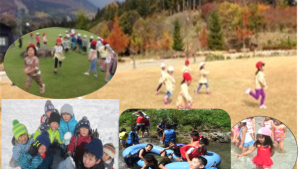Welcome to the website of the Project on Nuclear Power and Radiation, Anglican-Episcopal Church in Japan
Where are we, the No Nuke Project, going?
We are moving our activity bases and closing our Koriyama Office.
(February 2017)
Six years have passed since the catastrophic combination of earthquakes, tsunami, and nuclear power plant meltdown hit eastern Japan in March 2011. Now, the No Nuke Project is reforming its activities and organization.
In June 2016, the Anglican-Episcopal Church in Japan, in its 62nd (Regular) General Synod, re-positioned the No Nuke Project among the projects run by its “Peace and Justice Committee.” Also, the Project now has a new executive committee. With the new positioning and organization, the Project is now determined to carry on many of the activities it has been engaged in so far while, at the same time, taking some new steps towards a “World without Nuclear Power Plants,” the goal adopted by the Church’s General Synod of 2012.
Below is a description of the No Nuke Project’s new organization and activities.
Onahama Support Center
Since the Fukushima Daiichi meltdown began, our Onahama Support Center has been providing assistance to the residents of temporary housing in Izumi-Tamatsuyu, which accommodates refugees from the small town of Tomioka, Fukushima. The Center has also been assisting residents of the Hiruno Temporary Housing, where refugees from Okuma live. At the end of March 2017, however, the Support Center will terminate its activities.
Some Christian churches in the neighborhood of Izumi-Tamatsuyu will take over the support activities at that temporary housing from April 2017 onwards. At Hiruno, volunteers from St. Timothy’s Church, Onahama will continue support activities until that temporary housing is closed.
Over the last six years, more than 120 volunteers have participated in the support activities of Onahama Support Center, which succeeded the activities once provided at Hitachi, Ibaraki.
The No Nuke Project especially expresses our heart-felt gratitude to the three Dioceses of the Kansai Region, namely Kyoto, Osaka, and Kobe. These three Dioceses have been helping our Onahama activities to the very end. Also, we ask you to keep praying for all the refugees the Support Center has served.
Support Center Shinchi
Right after the March 2011 catastrophe, we launched “Support Center for Victims Shinchi Base,” which we later reorganized into “Support Center Shinchi.” Then, in June 2015, we moved the support center over to Gangoya, where we and many volunteers visited the residents of Gangoya Temporary Housing in their homes, held some mini-concerts and other activities, in addition to the “Wednesday Café.” Thus we “walked together” with the temporary housing residents in many ways.
Support Center Shinchi will be closed at the end of March 2017. From April onwards, the East Japan Disaster Relief Office (Higashi-Nihon Shinsai Shien Shitsu) of the Diocese of Tohoku will hold the “Wednesday Café” twice a month or so—less frequently than now. We ask for your continued prayer and help for that activity.
For inquiries on the “Wednesday Café” in and after April 2017, please contact: East Japan Disaster Relief Office (Higashi-Nihon Shinsai Shien Shitsu), Diocese of Tohoku, Anglican-Episcopal Church in Japan, 2-13-15, Kokubun-cho, Aoba Ward, Sendai, Miyagi Pref. 980-0803. Email; sien.tohoku@nskk.org
Koriyama Office
Located inside Sts. Peter and Paul’s Church, Koriyama, ever since its establishment in June 2013, this office has been performing its function as the head office of the activities which have enabled us to “walk together” with refugees from the meltdown. At the end of April 2017, this office will be closed.
Though the Office will be closed, our “Refresh (Retreat) Program,” basically outings for both kindergarten kids and their parents, will continue as it has. Also, although we have passed future “front-line” support activities for temporary housing residents to concerned volunteers, the No Nuke Project will continue to provide “behind-the-line” assistance.
Listed below are the Refresh Programs scheduled for April 2017 through March 2018.
| 1. St. Paul’s Kindergarten, Koriyama | |
| * 7 outings * Help programs for mothers (aimed at pre-school kids and their moms) – 2 outings and 3 baby yoga meetings | |
| * Assistance to “refresh trips” for faculty members, July to August, in three groups | |
| 2. St. Timothy’s Kindergarten, Onahama | |
| * Outings for kids and parents (4 times in all) | |
| 3. Financial aid for a “home stay” travel to Okinawa | |
| 4. Financial aid for a family camping trip to Takashima, Nagasaki Pref. | |
| 5. Kids’ camp at Gujo-hachiman, Gifu Pref. |
| — “Refresh Programs” at other places — |
Beginning in April 2017, The No Nuke Project will work with a completely different organization. We will have no full-time staffer dedicated to the Project. Still, our activities are meant to continue for many years to come. To do so, we need your help and prayers more than we did before. We continue to collect donations at our current accounts:
Postal saving account :
From inside Japan, send your donations to:
Account holder : Nippon Sei Ko Kai
Account No.: 00120-0-78536
Wire Transfer : From overseas, send your donations to:
Account holder : NIPPON SEI KO KAI
Address : 65 Yarai-cho, Shinjuku-ku, Tokyo 162-0805 JAPAN
Account Number : 4515547
Bank Name : The Bank of Tokyo-Mitsubishi UFJ, LTD.
Branch Name : Iidabashi
Bank Address : 3-7 Kagurazaka, Shinjuku-ku, Tokyo 162-0825 JAPAN
Swift Code : BOTKJPJ
Beginning in May 2017, please contact the No Nuke Project
E-mail: ikezumi-nyc.chubu@nskk.org (Kay Ikezumi)
| Announcement made on February 28th, 2017
No Nuke Project Executive Committee, Rev. Makito Aizawa (Chairperson), Ms. Kay Ikezumi, |
We, the Project, earnestly hope this website will help you share some of the tragedies lived and thoughts held by those refugees from the Fukushima Daiichi neighborhood, who are living every single day with inconveniences and emotional conflicts. We ask you to consider the issues inherent in or accompanying nuclear power.

